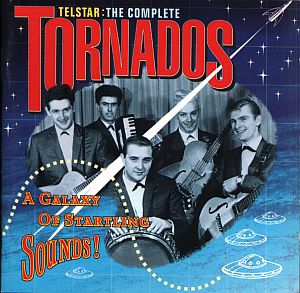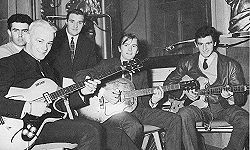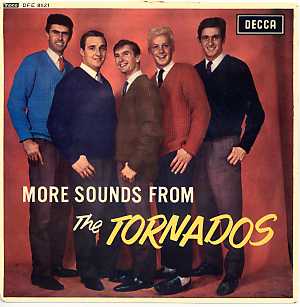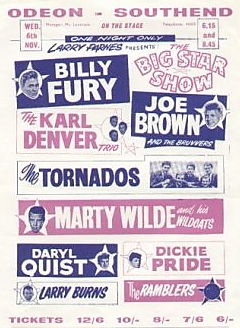THE TORNADOS STORY
|
The only serious challengers to the Shadows merely lasted as long as their console svengali, independent record producer Joe Meek. By the late 1950's the talented Meek had forced his way onto the music production scene, and was enlisted by the owner of Saga Records whose new label, Triumph boasted to make "records for the hit parade." Hits came almost immediately: The Fabulous Flee-Rakkers with "Green Jeans" (would have been bigger save a pressing-plant strike), then top ten with Michael Cox’s "Angela Jones". Distribution difficulties persuaded Meek to break from Triumph and he moved into his maisonette studios above a leather shop in the Holloway Road, London. From there finished productions would be leased to the major labels of the day (Decca, Pye, Parlophone, Columbia and HMV). Along the way he struck up a fruitful partnership with songwriter Geoff Goddard who displayed a knack of turning out memorable, wistful tunes who supplied a string of original sounding hits, often brilliantly realised by Meek.
Instrumental backing was provided by Meek's original in-house band the Outlaws until their own chart success meant a replacement band was required for studio work. Lead guitarist Alan Caddy (recommended by Meek singer Michael Cox) and drummer Clem Cattini, both of whom had served in Johnny Kidd’s Pirates (1959-61) replied to adverts. Rhythm guitarist George Bellamy was a session player while Heinz Burt on bass (complete with dyed blond hair like Jet Harris of the Shadows) was one of Meek’s protégés. The group went out on the road as the Charles Blackwell Orchestra, with supplemented by Pete Newman and Pete Cotton on Saxophone's, and as the Tornados backing one of Britain's biggest stars Billy Fury. Attempting to emulate the organ sound on Dave "Baby" Cortez's "Happy Organ", Meek had purchased a Clavioline, a small battery operated electronic keyboard that foreshadowed synthesisers.
It featured heavily on the producers' 1960 concept album "I Hear A New World" but had been little-used since. The instrument was monophonic, i.e. could only play one note at a time but Meek added plenty of compression and echo producing a far livelier sound. removed from mothballs it featured on the mid 1962 Tornados debut on Decca, "Love And Fury" (doff of the cap to Billy Fury) which Clem Catinni now considers to be "the first disco record" thanks to the minimalist melody and a distinctive percussion style taken straight from "Johnny Remember Me". A keyboardist was required to carry the economical melody, so Heinz recommended Norman Hale from his previous group, the Falcons. He only appeared on the topside, however, he was soon replaced by Roger La Vern (real name Jackson) after falling out with the quick-tempered Meek.
The second single broke them into the big league, although it wasn't the original choice. A gale-force version of "The Breeze And I" was witheld after discovering the Fentones were about to release their version (which charted). The technology-minded Producer was watching the firsr trans-Atlantic broadcast on TV via the new communications satellite. Tone-deaf but suitably inspired, Meek composed a new number in homage to "Telstar" and, as with other self-written numbers, he la-la'd the melody over a backling track, in this case Mike Berry's "One More Time"). As usual, Alan Caddy arranged it for the band.
|
The Tornados raced from Great Yarmouth (where they were appearing in a series of shows) to Meek's studio and had time to record the backing track and overdub the guitar breaks before having to race back in time for a stage appearance. Thus it was Geoff Goddard who stepped into the breech and played the clavioline melody-line. The resulting, quintessential, 60’s instrumental ushered in a new "electronic age" of music and anticipated many of the electronic ventures of a subsequent and less innocent pop generation. As a point of order, although Goddard played the melody lines Roger LaVery DID APPEAR on the record, having played the piano parts everywhere else in the record that were very much as important as the melody to the overall sound.
"Telstar topped the domestic hit parade in the autumn of 1962 but unbelievably did likewise in the USA where no UK group, not even the Shadows, had made any headway. The records' penetration over in the US helped Meek’s boys play a crucial role in paving the way for the "British Invasion" of US charts just a year later. It would have been better had a capitalising tour of North America not been unwisely cancelled. George Bellamy's "Ridin' The Wind" was recorded earlier than "Telstar" but was selected as the US follow-up after appropriate storm noises had been added to it. Decca even put a man in the States to publicise this and other releases but was withdrawn after their new stateside single barely scraped into the US top 100, not at all helped by no band to promote it, a real missed opportunity.




